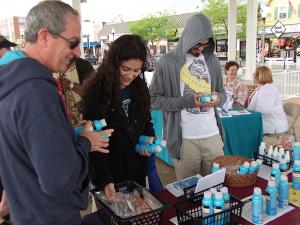Sussex Tech graduate aims to prevent melanoma
Lilith Elmore's life changed in 2009 when her mother was diagnosed with melanoma and then died from the illness two years later. The Sussex Tech graduate now intends to make skin cancer education her life's work.
Elmore, who graduated May 30, said she wants to make sure other daughters don't have to experience losing their mothers.
She completed her senior project on melanoma and is now volunteering with the Delaware Division of Public Health to spread the word about the importance of using sunscreen.
Don't Fry Day is a national event, sponsored by the National Council on Skin Cancer Prevention, and hosted locally by Delaware Department of Health and Social Services, Division of Public Health's Comprehensive Cancer Program and Tunnell Cancer Center. Besides focusing on sunbathers on Cape Region beaches, the agencies are also targeting those using tanning beds.
|
How sunscreen works If you apply a sunscreen rated at SPF 2, you will double the time it takes for your skin to burn. A sunscreen rated at SPF 15 will multiply the burning time by 15. The SPF number indicates the screening ability for UVB rays only. Research is being to done to establish a system to measure UVA protection. There is a point of diminishing returns with sunscreens. Here’s how it goes: • A sunscreen with an SPF of two screens 50 percent of UVB rays. • A sunscreen with an SPF of 15 screens 93 percent of UVB rays. • A sunscreen with an SPF of 30 screens 97 percent of UVB rays. • A sunscreen with an SPF of 50 blocks 98 percent of UVB rays. • A sunscreen with an SPF of 100 blocks 99 percent of UVB rays. Not applying enough sunscreen can seriously reduce your protection. You should use an ounce - about a palmful - on your body to gain the full protection indicated by the SPF on the product. Also, dermatologists advise reapplication every two hours or after swimming or sweating. |
||||
"We want Delawareans to know that no tanning is safe," said DHSS Secretary Rita Landgraf. "Everyone should be extremely cautious."
Elmore talked to residents who stopped by the No Fry Day booth May 24 at the Rehoboth Bandstand about the importance of using and reapplying SPF 30 sunscreen. Sunscreens lower than SPF 30 do not provide enough protection from the sun's rays, Elmore said.
Elmore said she also applies sunscreen to the part in hair part because her mom's cancer started on her scalp.
Elmore said she is encouraged because many companies like Aveda and Neutrogena are getting higher-SPF products to the market.
Delaware's rate of malignant melanoma cases is increasing two-thirds faster than the U.S. rates, said Division of Public Health Director Karyl Rattay.
Elmore plans to continue her work on melanoma when she heads to Eastern University near Philadelphia to study biology in the pre-med program.
"I'm not sure what I will do, but I want to make an impact," Elmore said. "No treatment, drug, doctor or surgery could keep this deadly disease from spreading to my mother's lungs, but through grieving, I knew I wanted to make skin cancer awareness part of my life."
Take these steps to prevent skin cancer:
• Stay indoors or seek shade when rays are most dangerous from 10 a.m. to 4 p.m.
• Use a water-resistant sunscreen with SPF 30 or higher
• Reapply sunscreen every two to three hours
• Wear a hat and sunglasses
• Encourage children to play in shade and reapply sunscreen regularly
• Avoid tanning beds
Have your doctor look at moles that are not symmetrical, have uneven borders, change color, itch or bleed to make sure they are not cancerous.
The earlier skin cancer is detected, the more likely it can be treated before it spreads to other areas of the body.
For more information, call the Division of Public Health at 302-744-1040 or go to www.cdc.gov/cancer/skin.






















































